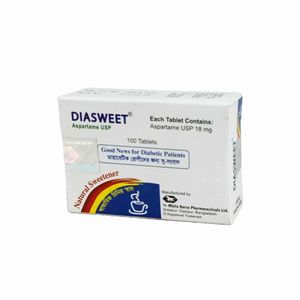Diasweet Uses, Dosage, Side Effects and more
Diasweet is a low-calorie sweetener used to sweeten a wide variety of low- and reduced-calorie foods and beverages, including low-calorie tabletop sweeteners. Diasweet is composed of two amino acids, aspartic acid and phenylalanine, as the methyl ester. Aspartic acid and phenylalanine are also found naturally in protein containing foods, including meats, grains and dairy products. Methyl esters are also found naturally in many foods such as fruits and vegetable and their juices. Upon digestion, aspartame breaks down into three components (aspartic acid, phenylalanine and methanol), which are then absorbed into the blood and used in normal body processes. Neither aspartame nor its components accumulates in the body. These components are used in the body in the same ways as when they are derived from common foods.Diasweet is 180 to 200 times sweeter than sucrose, it is metabolized as a protein and its subsequent amino-acids used up in there respective mechanisms.
Diasweet (L-alpha-aspartyl-L-phenylalanine methyl ester) is a low-calorie sweetener used to sweeten a wide variety of low- and reduced-calorie foods and beverages, including low-calorie tabletop sweeteners. Diasweet is composed of two amino acids, aspartic acid and phenylalanine, as the methyl ester. Aspartic acid and phenylalanine are also found naturally in protein containing foods, including meats, grains and dairy products. Methyl esters are also found naturally in many foods such as fruits and vegetable and their juices. Upon digestion, aspartame breaks down into three components (aspartic acid, phenylalanine and methanol), which are then absorbed into the blood and used in normal body processes. Neither aspartame nor its components accumulates in the body. These components are used in the body in the same ways as when they are derived from common foods.

| Attribute | Details |
|---|---|
| Trade Name | Diasweet |
| Generic | Aspartame |
| Aspartame Other Names | Asp-phe-ome, Aspartam, Aspartame, Aspartamo, Aspartamum, Aspartylphenylalanine methyl ester |
| Weight | 18mg, |
| Type | Tablet, Powder |
| Formula | C14H18N2O5 |
| Weight | Average: 294.3031 Monoisotopic: 294.121571696 |
| Groups | Investigational, Nutraceutical |
| Therapeutic Class | Oral nutritional preparations |
| Manufacturer | The White Horse Pharma, Konimex |
| Available Country | Bangladesh, Indonesia |
| Last Updated: | January 7, 2025 at 1:49 am |
Uses
Used as a diet supplement and sugar substitute.
Diasweet is also used to associated treatment for these conditions: Sweeteners
How Diasweet works
180 to 200 times sweeter than sucrose, it is metabolized as a protein and its subsequent amino-acids used up in there respective mechanisms.
Dosage
According to individual taste. 1 pellet is equivalent in sweetness to 1 tsf of sugar.
How Long Does It Take to Work?
How Long Does It Take to Work? see here Diasweet
Side Effects
Constipation; faecal impaction; haemorrhoids; abdominal discomfort or pain; heartburn; flatulence; nausea; vomiting; diarrhoea; increased bleeding tendency (chronic use); osteoporosis; steatorrhoea (high doses); skin rashes; pruritus of the tongue, skin and perianal region; hyperchloraemic acidosis.
Toxicity
Mild gastrointestinal side effects including diarrhea have been reported.
Precaution
If pregnant or breast-feeding, seek advice of a health professional before use.
Interaction
There are no known drug interactions and none well documented.
Elimination Route
Absorbed in the small intestine, aspartame is metabolized and absorbed very quickly.
Half Life
At room temperature, aspartame is most stable at pH 4.3, where its half-life is nearly 300 days. At pH 7, its half-life is shortened to only a few days.
Pregnancy & Breastfeeding use
Pregnancy Category-C. Animal reproduction studies have shown an adverse effect on the fetus and there are no adequate and well-controlled studies in humans, but potential benefits may warrant use of the drug in pregnant women despite potential risks.
Contraindication
Complete biliary obstruction, hypersensitivity.



